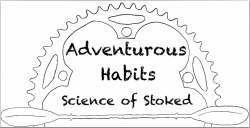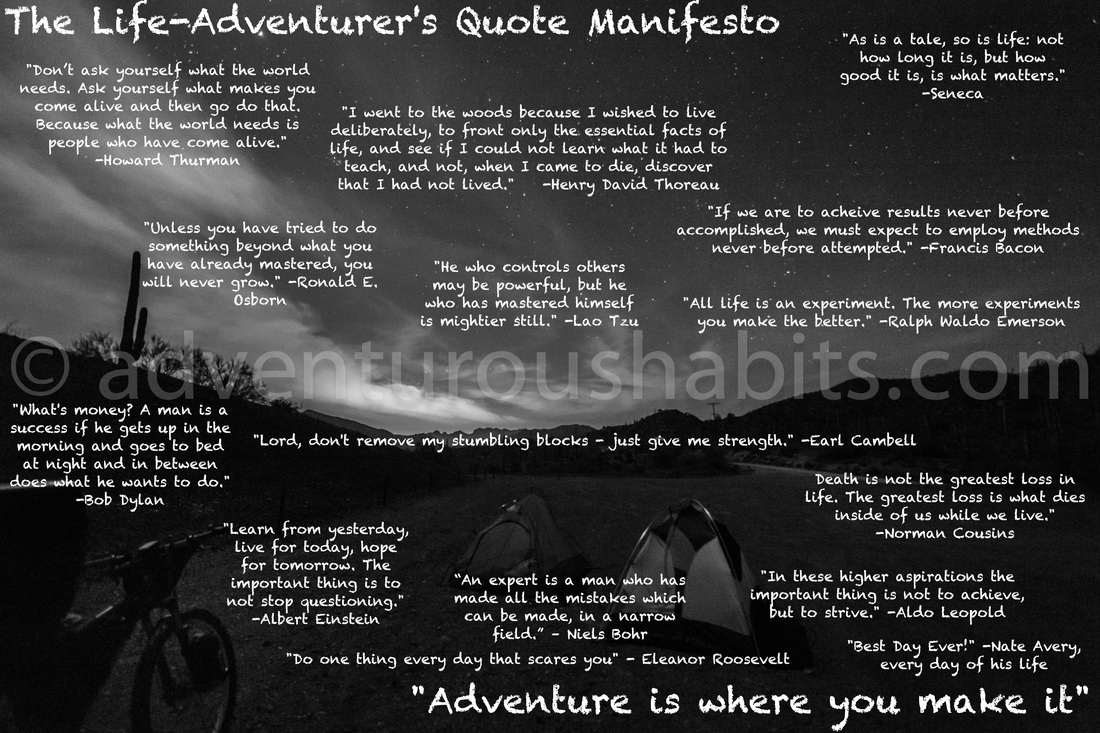If something is adventurous, then by nature isn’t it NOT habitual?
Well, there are two ways habits can be adventurous.
The first is that the purpose here is to create the habit of getting out of your comfort zone, and making that comfortable.
We grow most by doing the things that truly scare us and simultaneously make us come alive. If you can get in the habit of doing things that make you a bit uncomfortable and learning to make them comfortable, you are well on your way to taking over the world.
Unfortunately, you don’t just do something once and become comfortable with it. I have traditionally climbed many, many routes. Every time, I still have to remind myself to focus on the process goal (we’ll discuss this later) of breathing deeply and smoothly throughout the route - I still have more practice to do before I am truly comfortable with this uncomfortable process. But I am making progress. So in making a habit of practicing this process in a specific way, I have made an adventurous habit. What uncomfortable task are you working on making comfortable?
The second way a habit can be adventurous is in saving willpower to go and do the adventurous things you desire. There have been plenty of times that I wanted to go on a new trail run, but I was just so burned out at the end of my work day that I didn’t have the willpower to go and venture into the unknown. By creating daily habits that serve to renew my energy and focus, I can save willpower for later in the day when I want to practice making myself uncomfortable.
Well, there are two ways habits can be adventurous.
The first is that the purpose here is to create the habit of getting out of your comfort zone, and making that comfortable.
We grow most by doing the things that truly scare us and simultaneously make us come alive. If you can get in the habit of doing things that make you a bit uncomfortable and learning to make them comfortable, you are well on your way to taking over the world.
Unfortunately, you don’t just do something once and become comfortable with it. I have traditionally climbed many, many routes. Every time, I still have to remind myself to focus on the process goal (we’ll discuss this later) of breathing deeply and smoothly throughout the route - I still have more practice to do before I am truly comfortable with this uncomfortable process. But I am making progress. So in making a habit of practicing this process in a specific way, I have made an adventurous habit. What uncomfortable task are you working on making comfortable?
The second way a habit can be adventurous is in saving willpower to go and do the adventurous things you desire. There have been plenty of times that I wanted to go on a new trail run, but I was just so burned out at the end of my work day that I didn’t have the willpower to go and venture into the unknown. By creating daily habits that serve to renew my energy and focus, I can save willpower for later in the day when I want to practice making myself uncomfortable.
“Your audacious life goals are fabulous. We’re proud of you for having them. But it’s possible that those goals are designed to distract you from the thing that’s really frightening you - the shift in daily habits that would mean a re-invention of how you see yourself”
-Seth Godin
How much willpower do you have? Rank yourself on a scale of 0 - 10.
If you favorite unhealthy food is on the counter in front of you, how many times out of 10 will you eat it? Compare 10 times in the early morning vs. after work.
We have a problem with an important societal convention. We tend to think of willpower as something you either have or you don’t, and if you have it... well, you just need to use it!
The problem is that willpower is much like a muscle - it can be trained and get stronger, but it can also get tired and ineffective if you use it too much! If you spend all day at a job you hate, willing yourself onward to get through the next meeting, your willpower will be tired when you get home. Now just try to will yourself to go on that run or to decline that cookie - ha!
Luckily for us, science is beginning to show us the extreme power of habit. We’ll get into the specifics of habits next week, but first know this: completing a habit is essentially allowing your brain to go on autopilot. Read into this: no willpower required!
By using the science of habit formation, you can free up more willpower that can be used when you really need it. Hold up - read that last sentence again. Habits free up more willpower. Yeah, habits are powerful; this the Brave Monkeys know.
However, we have to know how to effectively create habits, first. Tune in next Thursday for The Straight Dope on Habit Formation.
If you favorite unhealthy food is on the counter in front of you, how many times out of 10 will you eat it? Compare 10 times in the early morning vs. after work.
We have a problem with an important societal convention. We tend to think of willpower as something you either have or you don’t, and if you have it... well, you just need to use it!
The problem is that willpower is much like a muscle - it can be trained and get stronger, but it can also get tired and ineffective if you use it too much! If you spend all day at a job you hate, willing yourself onward to get through the next meeting, your willpower will be tired when you get home. Now just try to will yourself to go on that run or to decline that cookie - ha!
Luckily for us, science is beginning to show us the extreme power of habit. We’ll get into the specifics of habits next week, but first know this: completing a habit is essentially allowing your brain to go on autopilot. Read into this: no willpower required!
By using the science of habit formation, you can free up more willpower that can be used when you really need it. Hold up - read that last sentence again. Habits free up more willpower. Yeah, habits are powerful; this the Brave Monkeys know.
However, we have to know how to effectively create habits, first. Tune in next Thursday for The Straight Dope on Habit Formation.


